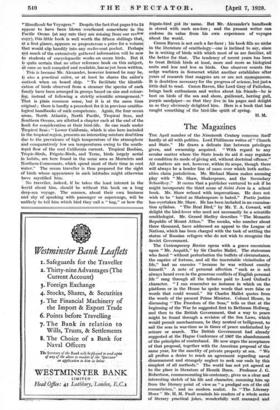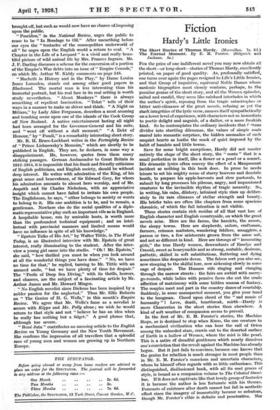The Magazines
THE April number of the Nineteenth Century concerns itself hardly at all with politics. Lord Phillimore writes of " Church and State." He draws a delicate line between privileges given, and ownership acquired. " With regard to any secular matter where the State lends its aid it may regulate or condition its mode of giving aid, without doctrinal offence." All matters are not, however, within its scope, though there will always be a border line of cases over which both autho- rities claim jurisdiction. Mr. Michael Mason makes amusing play with " Mr. Shaw, Shakespeare, and the Secondary Schoolboy." It seems that a publisher ventured to ask if he might incorporate the third scene of Saint Joan in a school book. Mr. Shaw refused with imprecations. He does not wish to be " hated as Shakespeare is hated." Poetic justice has overtaken Mr. Shaw. He has been included in an examina- tion syllabus. " The Real Bird," by Mr. T. A. Coward, will delight the bird-lover who need not necessarily be a scientific ornithologist. Mr. Gerard Shelley, describes " The Monastic Republic of Mount Athos." The monks, who number about three thousand, have addressed an appeal to the League of Nations, which has been charged with the task of settling the status of Russian refugees who do not wish to recognize the Soviet Government.
The Contemporary Review opens with a grave encomium upon_" Mr. Asquith," by Sir Charles Mallet.' The statesman who faced " without perturbation the buffets of circumstance, the caprice of fortune, and all the inscrutable vicissitudes of life," had no enemies " because he was without enmity himself." A note of personal affection " such as is not always heard even in the generous conflicts of English personal life " rang through all the tributes paid to Lord Oxford's character. " I can remember no instance in which on the platform or in the House he spoke words that were false or words that could wound." Sir Charles Mallet quotes from the words of the present Prime Minister. Colonel House, in discussing " The Freedom of the Seas," tells us that at the beginning of the War he suggested first to Bethman Hollweg, and then to the British Government, that a way to peace might be found through a revision of the Sea Laws, which would permit merchantmen, be they neutral or belligerent, to sail the seas in war-time as in times of peace undisturbed by seizure or search. The British Government had already suggested at the Hague Conference of 1907 the abandonment of the principles of contraband. He now urges the acceptance of that proposal, together with the American proposal of the same year, for the sanctity of private property at sea. " We all profess a desire to reach an agreement regarding naval disarmament and strangely neglect to seek our ends by this simplest of all methods." The world has not yet agreed as to the place in literature of Henrik Ibsen. Professor J. G. Robertson,.commemorating his centenary, gives us a clear and interesting sketch of his life and character, summing him up from the literary point of view us " a prodigal son of the old romanticism," and no modern realist. In " The Literary Hoax " Mr. H. M. Paull reminds his readers of a whole series of literary practical jokes, wonderfully well managed and
brought off, but such as would now have no chance otimposing upon the public.
" Poseidon," in the National Review, urges the public to cease to be " In Bondage to Oil." After unearthing before our eyes the " tentacles of the cosmopolitan underworld of oil "• he urges upon the English world a return to coal. " A Chapter in the Life of a Leopard " is a vivid and really beau- tiful picture of wild animal life by Mrs. Frances Ingram. Mr. J. F. Darling discusses a scheme for the conversion of a portion of the Empire's War debts into an issue of " Empire Consols," on which Mr. Arthur W. Kiddy comments on page 548.
" Macbeth in History and in the Play," by Dame Louisa Innes Lumsden, stands out among other good papers in Blackwood. The mortal man is less interesting than his immortal portrait, but his real face in its real setting is worth study nevertheless. " About Monkeys " there is always something of repellent fascination. " Tekri " tells of their ways in a manner to make us shiver and think. " A Night on Mitiaro," by Lady Alice Fergusson, describes a most amusing and touching scene upon one of the islands of the Cook Group off New Zealand. A native entertainment lasting all night had been arranged for the Governor-General and his suite, and " went off without a dull moment." " A Debt of Honour," by " Fundi," is a remarkably interesting short story.
Mr. R. H. Bruce-Lockhart writes in the .Fortnightly Review of " Prince Lichnowsky's Memoirs," which are shortly to be published in English. They are, he declares, in some way a disappointment. He, however, quotes from them many striking passages. German Ambassador to Great Britain in 1912-1914, it is impossible that his frank and friendly criticisms of English politicians, and English society, should be without deep interest. He writes with admiration of the King, of his great sense and benevolence, of Sir Edward Grey, for whom his admiration amounts to almost hero worship, and of Mr. Asquith and Sir Charles Nicholson, with an appreciative insight which cannot have failed to irritate his own people. The Englishman, he says, " either belongs to society or wants to belong to it. His one ambition is to be, and to remain, a gentleman. Nowhere else do the social qualities of a diplo- matic representative play such an important rale as in England. A hospitable house, run by amicable hosts, is worth more than the profoundest technical equipment ; and an intel- lectual with provincial manners and limited means would have no influence in spite of all his knowledge."
" Epstein Talks of His Art," by Walter Tittle, in The World Today, is an illustrated interview with Mr. Epstein of great interest, really illuminating to the student. After the inter- view a young girl came into the studio. " Oh Mr. Epstein," she said, " how thrilled you must be when you look around at all the wonderful things you have done." " No, we have no time for that," he replied, turning to Mr. Tittle with an amused smile, " but we have plenty of time for despair." The " Perils of Deep Sea Diving," with its thrills, horrors, and chances, are the subject of a fascinating article by Mr. Arthur James and Mr. Howard Mingos.
"No English novelist since Dickens has been inspired by, a nobler passion for the neglected." Thus Mr. Ellis Roberts on " The Genius of H. G. Wells," in this month's Empire Review. We agree that Mr. Wells's fame as a novelist is secure with Kipps and Mr. Polly alone ; we wish he would return to that style and not " believe he has an idea when he really has nothing but a fidget." A good phrase that, although too severe.
" Rene Jute " contributes an amusing article to the English Review on Young Germany and the New Youth Movement. She confirms the impression of all travellers that a splendid race of young men and women are growing up in Northern Europe.







































 Previous page
Previous page